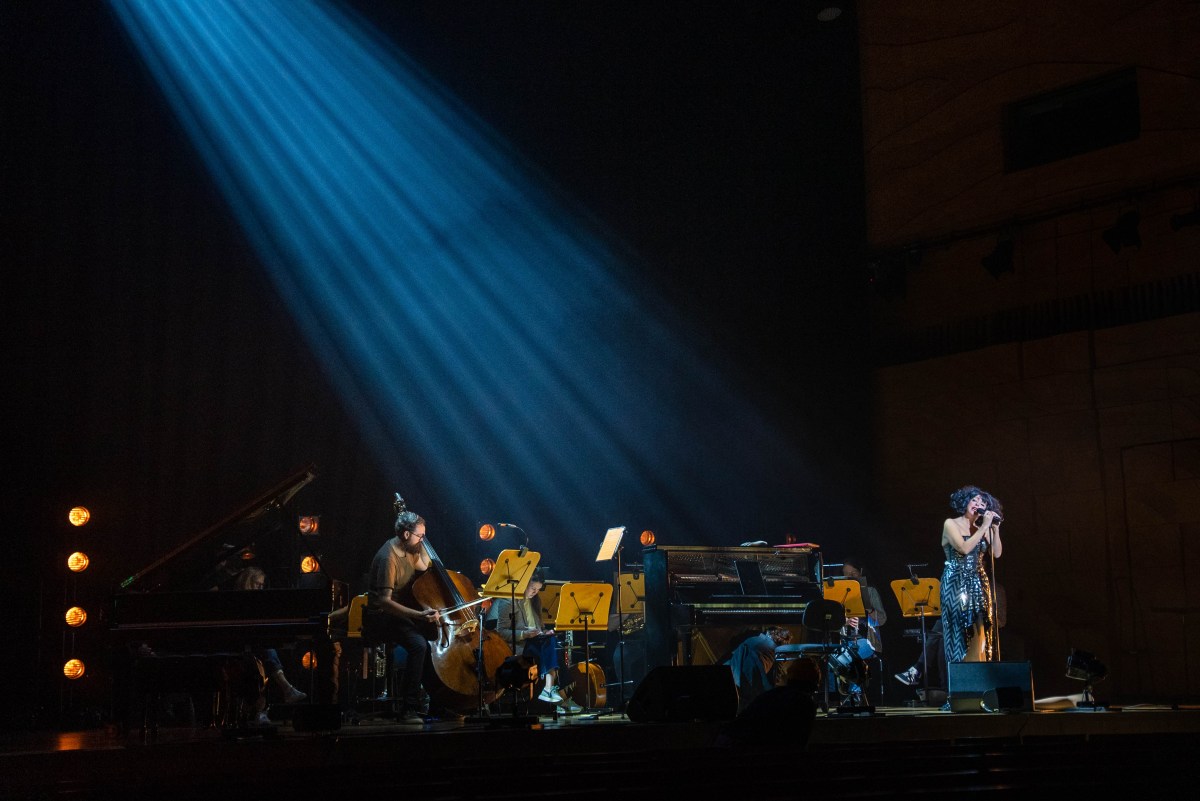In The 20s, and All That Dissonance, revered cabaret performer Meow Meow weaves a masterful narration around the relationships between the social and aesthetic discord and breakdown in the early 20th Century.
From the beginning of the first act she frames the history, making a point about the year 1922. It is no coincidence she is marking the 100th anniversary of this era. All the components of the show – the poetry which dissolves language, the historical details, and the shattering tonalities of the compositions she chooses – give a compelling combination of a dark sense of foreboding and a relentless experimentalism.
Her storytelling, along with the musical arrangements, articulate the spirit of modernism and reflect the breakdown in values that was happening in Europe between the two great wars.
Ultimately, the show is about the relationship between social breakdown and fascism, and the relationship of the arts to that process. It is a thought-provoking and beautifully put together work examining the social fabric which gave rise to the first era of European fascism from the viewpoint of the rising second era, now. The theme of the breakdown of the ideals of the enlightenment, of harmony and reason, runs throughout. Meow Meow only makes this explicit through an aside comment, but her intent is clear: Periods of great experimentation also give rise to a desire to repress them.
Although the show sometimes has a feeling of a work in progress, Meow Meow’s skilled, witty and highly entertaining performance expertise holds the show together and turns uncertain moments into success. It begins with a slapstick comic routine of her entering the stage, but soon gives way to pianist Aura Go bumping her off the piano stool to perform the first composition, Francis Picabia’s minimalist opus, La Nourrice Americaine, which consists of three notes ‘played ad infinitum’.
The rest of the first act is a well-balanced, and an exquisitely curated exchange between Meow Meow and the musicians from the MSO, covering Hindemith’s Chamber Music No.2 for Piano & 12 Solo Instruments, poems by Kurt Schwitters and Tristan Tzara, classic songs by Brecht and Weill, and others, such as ‘Ich Bin ein vamp’, and ‘Wenn ick mal tot bin’.
These numbers give the supreme cabaret artiste the opportunity to strut her stuff on some of the classics of the genre from the peak period of its artistic flowering. In particular, her delivery of Schwitters’ Cigarren and Edith Sitwell’s rhythmic poetry alongside Walton’s Facade allow her to shine. A clever use of light and costume makes the interpretation of Hollander’s Wenn ick mal tot bin (When I am dead) one of the highlights of the evening.
Act 2 comprises solely of The Soldier’s Tale, by Igor Stravinsky and C.F. Ramuz; an hour of twisted dissonant folkish themes and ditties played on strings and percussion, accompanying a text encapsulating the self-destruction of 1920s Europe. It’s a story of greed and succumbing to the allure of evil. Conductor and violinist Christopher Moore performs the part of the devil with aplomb.
Even in the large auditorium, Meow Meow deploys her cabaret skills in direct audience participation to great effect. She elicits many laughs, although at times it appears she expects applause when there is none – perhaps highlighting a clash of genre conventions between the MSO-trained classical music crowd and the rhythms of the cabaret show.
The orchestra, led by co-creator Moore, gives a competent rendition of the compositions but sometimes lacks expressive clarity, which perhaps indicates that this is a work in early stages of the development. However, being the experienced performer she is, Meow Meow turns these errors into triumphs. What is clear is the shared appreciation of the music and the content between the musicians and narrator. This is a labour of love.
Read: Theatre review: The Mousetrap
After curtain calls, Meow returns and plays a tinny recording of the three notes of Picabia’s emblematic composition, ad infinitum. And the cycle continues.
The 20s, and All That Dissonance
Melbourne Symphony Orchestra
Conductor: Christopher Moore
Co-curator, vocalist & narrator: Meow Meow
Piano: Aura Go
The 20s, and All That Dissonance was performed at the Melbourne Recital Centre on the 6 and 8 of October 2022.





